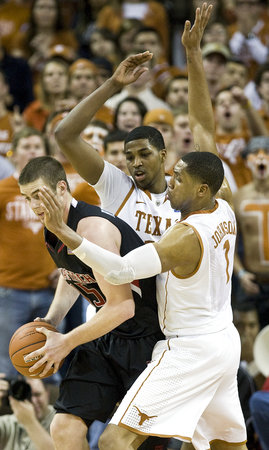The Texas defense was stifling in the first half When the calendar turned to 2010, the once-invincible Texas Longhorns unraveled in a fashion rarely seen in sports. After starting 17-0, last year’s team sputtered down the homestretch, winning just 7 of their last 17 games. This year’s batch of Longhorns have clearly learned from their past mistakes. Instead of wilting down the stretch, they are visibly improving as the season goes along. While Texas was a dominant defensive team during a very tough non-conference run, they have turned it up another notch in conference play. Last night was more of the same, as the Longhorn defense forced 17 turnovers and held Texas Tech to 38.2% shooting from the field en route to a 76-60 win over the Red Raiders in Austin. The victory moved Texas to 8-0 in Big 12 play, one game ahead of Kansas, and 3.5 games ahead of third-place Baylor. It looked like yet another blowout in the early going, as Texas held the Red Raiders to just 11 points in their first 20 possessions. At the same time, the Horns were finding open shots everywhere they looked. They built a lead as large as 21 points in the waning minutes of the first half, powered by 6-of-11 shooting from behind the arc. The second half was a different story, and it resulted in a much closer game than anyone could have expected. The Longhorns took six minutes and 46 seconds to make their first field goal in the second half, letting the Red Raiders slice the lead to just six points with 11:20 to go. But J’Covan Brown sandwiched a pair of threes around a mid-range jumper from Gary Johnson, and the Horns cruised to victory. What looked good In the first half, everything looked good for Texas. Jordan Hamilton knocked down his first four attempts from three-point range, while the Longhorn defense held Tech to just 0.55 points per possession over the first 12 minutes. Tristan Thompson was getting great position on the blocks and taking perfect angles to score once his teammates fed him the ball.
J’Covan Brown was a dead-eye from behind the arc One of the main men dishing out assists was J’Covan Brown, who had another solid game off the bench. His two three-pointers stopped the bleeding in the second half, and he finished with 10 points and three assists in 26 minutes on the court. The two-headed monster of Alexis Wangmene and Matt Hill also chipped in from the bench, taking advantage of their smaller Tech opponents. Wangmene earned three points at the line, while Hill had a pair of putbacks and an easy layup off an assist from Jai Lucas. Hill also grabbed six rebounds against an undersized Tech squad. What needed work While Hill grabbed six rebounds, the Longhorns did a poor job rebounding against a Tech team that is routinely abused on the glass. In Lubbock, Texas won the rebounding battle by 19. In Austin, they only outrebounded Tech by three. The Longhorns allowed the Red Raiders to grab 37.3% of their missed shots, after allowing them to win just 19.2% of the offensive rebounds in Lubbock. The 37.3% mark was the sixth-highest OR% for the Red Raiders in their 24 games this season. A big cause of the rebounding woes was Gary Johnson’s absence on the glass. While GJ scored 16 points, largely on the strength of his smooth long-range jumper, he was a ghost on the boards. The team obviously benefits from his 17-footer, as he typically sinks that shot, while pulling bigger defenders out of the lane. But the failure to grab even a single board on the defensive end could prove to be critical against a better ballclub than Tech. On defense, the Horns gave up far too many easy looks during the last three-quarters of the game. It may seem ridiculous to harp on the defense when they allowed just 0.873 points per possession. But a big reason why Texas was able to post good point-per-possession numbers is because they forced a lot of Tech turnovers. The Red Raiders coughed it up on 24.7% of their possessions, meaning that they were making a very high percentage of their shots when they managed to hang on to the basketball. The reason? Easy layups and jumpers coming off of curls when the Longhorn defenders completely lost their men. That smacks of lazy defense with too much ball-watching and not enough rotation. Perhaps the Horns played down to their competition, knowing they could give partial effort on defense and still win. A fair argument, but still a troubling one. If they have a similar lack of effort in Colorado, against a team that hardly ever turns the ball over, Texas will leave Boulder with a loss. Finally, it must be noted that the sloppy effort wasn’t limited just to the defense over the last thirty minutes. The Longhorns also had just as much trouble hanging on to the basketball, piling up more turnovers (16) than assists (15), many of them on boneheaded errors. Cory Joseph had a pair of double-dribble calls, while the Longhorns fumbled numerous passes just feet from the basket. Thankfully, this weak effort came against one of the worst teams in the conference. It’s a true luxury to play one of your worst games of the year and still come away with a 16-point win. The trajectory this team has taken so far this year leads us to believe that this effort will only lead to improvement in the near future. Expect the Longhorns to once again be firing on all cylinders by tip-off on Wednesday night. Next up: at Oklahoma (12-10 overall, 4-4 Big 12); Wednesday, 8 P.M. CT |
2 Responses to “Horns defeat Tech despite sloppy effort”











on 06 Feb 2011 at 11:52 am # Grant
One to add to “What looked good”- Cory’s first half steal breakaway slam over Singletary. FACE.
I was happy Tech played better in the second half; I’d like to see us get pushed a bit whether than just blow everyone out in this stretch.
on 06 Feb 2011 at 12:20 pm # Tweets that mention Longhorn Road Trip » Horns defeat Tech despite sloppy effort -- Topsy.com
[…] This post was mentioned on Twitter by Texas Longhorns Buzz, Ryan Clark. Ryan Clark said: It wasn't pretty, but #Texas moved to 8-0 in the Big 12 after a home win over Tech last night. LRT's look back at the W: http://ow.ly/3Rc85 […]